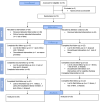Online Group-Based Dual-Task Training to Improve Cognitive Function of Community-Dwelling Older Adults: Randomized Controlled Feasibility Study
- PMID: 40378407
- PMCID: PMC12125557
- DOI: 10.2196/67267
Online Group-Based Dual-Task Training to Improve Cognitive Function of Community-Dwelling Older Adults: Randomized Controlled Feasibility Study
Abstract
Background: Cognitive training for older adults is crucial before cognitive impairment emerges. During periods of social distancing like the COVID-19 pandemic, cognitive stimuli are lacking. Online dual-task training is proposed as a solution to address these needs.
Objective: We aimed to explore the feasibility, acceptance, and potential effects of online group-based dual-task training as an intervention for enhancing cognitive function among community-dwelling older adults.
Methods: A randomized controlled feasibility study was conducted with 76 participants in Hong Kong, randomly assigned to the intervention and attention control groups in a ratio of 2:1 (n=50, 66% and n=26, 34%, respectively). The intervention group underwent 60-minute online dual-task training sessions twice a week for 12 weeks, incorporating cognitive components (upper limb and finger movement, arithmetic operation, and verbal fluency) and physical components (chair-based exercises) developed through a co-design approach. The attention control group received online health talks. Outcomes related to feasibility and acceptance included class attendance and self-reported satisfaction. Main outcomes related to potential effects included the Memory Inventory in Chinese and the Montreal Cognitive Assessment 5 Minutes (Hong Kong Version) at baseline, 6 weeks (midintervention), 12 weeks (postintervention) and 18 weeks (follow-up). Descriptive statistics and linear mixed effects models were used. Effect size was described with Cohen d. Qualitative feedback was collected from 12 informants and analyzed by thematic analysis.
Results: About 72% (36/50) of the participants in the intervention group and 62% (16/26) in the control group attended over 75% of the classes. In total, 44 (88%) participants from the intervention group provided acceptance feedback; 82% (36/44) were satisfied and 84% (37/44) would recommend the training to others. Improvement in the Memory Inventory in Chinese score in the intervention group was observed at midintervention, postintervention, and follow-up, with a medium-to-large effect size (d=0.65, 0.43 and 0.85, respectively). Adjusting for baseline values, the between-group differences in the Montreal Cognitive Assessment 5 Minutes (Hong Kong Version) score attained a small-to-medium effect size at midintervention (d=0.34) and postintervention (d=0.23). Qualitative feedback highlighted the timesaving and convenient aspects of online dual-task training, with participants finding the sessions challenging and enjoyable, and reporting benefits across cognitive, physical, and psychosocial domains. However, a preference for traditional in-person training was noted among the older adults despite the advantages of online training.
Conclusions: Online dual-task training is a feasible intervention accepted by the older adults, with potential benefits in cognitive abilities. Online training may complement in-person sessions. Further investigation in a full-scale randomized controlled trial is warranted to comprehensively explore its effects and address areas for improvement.
Trial registration: ClinicalTrials.gov NCT05573646; https://clinicaltrials.gov/study/NCT05573646.
Keywords: Hong Kong; co-design; cognitive training; dual-task; older adults; online.
©Pui Hing Chau, Denise Shuk Ting Cheung, Jojo Yan Yan Kwok, Wai Chi Chan, Doris Sau Fung Yu. Originally published in JMIR Aging (https://aging.jmir.org), 16.05.2025.
Conflict of interest statement
Conflicts of Interest: PHC is an Associate Editor for JMIR Aging.
Figures
Similar articles
-
Effects of a blended face-to-face and eHealth lifestyle intervention on physical activity, diet, and health outcomes in Hong Kong community-dwelling older adults: a randomized controlled trial.BMC Public Health. 2025 Jun 10;25(1):2145. doi: 10.1186/s12889-025-23311-0. BMC Public Health. 2025. PMID: 40495124 Free PMC article. Clinical Trial.
-
A cognitively enhanced online Tai Ji Quan training intervention for community-dwelling older adults with mild cognitive impairment: A feasibility trial.BMC Geriatr. 2022 Jan 25;22(1):76. doi: 10.1186/s12877-021-02747-0. BMC Geriatr. 2022. PMID: 35078407 Free PMC article. Clinical Trial.
-
Effects of Virtual Reality Motor-Cognitive Training for Older People With Cognitive Frailty: Multicentered Randomized Controlled Trial.J Med Internet Res. 2024 Sep 11;26:e57809. doi: 10.2196/57809. J Med Internet Res. 2024. PMID: 39259959 Free PMC article. Clinical Trial.
-
Folic acid supplementation and malaria susceptibility and severity among people taking antifolate antimalarial drugs in endemic areas.Cochrane Database Syst Rev. 2022 Feb 1;2(2022):CD014217. doi: 10.1002/14651858.CD014217. Cochrane Database Syst Rev. 2022. PMID: 36321557 Free PMC article.
-
Screening for Cognitive Impairment in Older Adults: An Evidence Update for the U.S. Preventive Services Task Force [Internet].Rockville (MD): Agency for Healthcare Research and Quality (US); 2013 Nov. Report No.: 14-05198-EF-1. Rockville (MD): Agency for Healthcare Research and Quality (US); 2013 Nov. Report No.: 14-05198-EF-1. PMID: 24354019 Free Books & Documents. Review.
References
-
- Woodard JL, Seidenberg M, Nielson KA, Smith JC, Antuono P, Durgerian S, Guidotti L, Zhang Q, Butts A, Hantke N, Lancaster M, Rao SM. Prediction of cognitive decline in healthy older adults using fMRI. J Alzheimers Dis. 2010;21(3):871–85. doi: 10.3233/JAD-2010-091693. https://europepmc.org/abstract/MED/20634590 M27677251202372G - DOI - PMC - PubMed
-
- Salthouse T. Consequences of age-related cognitive declines. Annu Rev Psychol. 2012;63:201–26. doi: 10.1146/annurev-psych-120710-100328. https://europepmc.org/abstract/MED/21740223 - DOI - PMC - PubMed
-
- Comijs HC, Dik MG, Aartsen MJ, Deeg DJ, Jonker C. The impact of change in cognitive functioning and cognitive decline on disability, well-being, and the use of healthcare services in older persons. Results of Longitudinal Aging Study Amsterdam. Dement Geriatr Cogn Disord. 2005;19(5-6):316–23. doi: 10.1159/000084557.84557 - DOI - PubMed
-
- Pereira Oliva HN, Mansur Machado FS, Rodrigues VD, Leão LL, Monteiro-Júnior RS. The effect of dual-task training on cognition of people with different clinical conditions: an overview of systematic reviews. IBRO Rep. 2020 Dec;9:24–31. doi: 10.1016/j.ibror.2020.06.005. https://linkinghub.elsevier.com/retrieve/pii/S2451-8301(20)30020-0 S2451-8301(20)30020-0 - DOI - PMC - PubMed
Publication types
MeSH terms
Associated data
LinkOut - more resources
Full Text Sources
Medical



